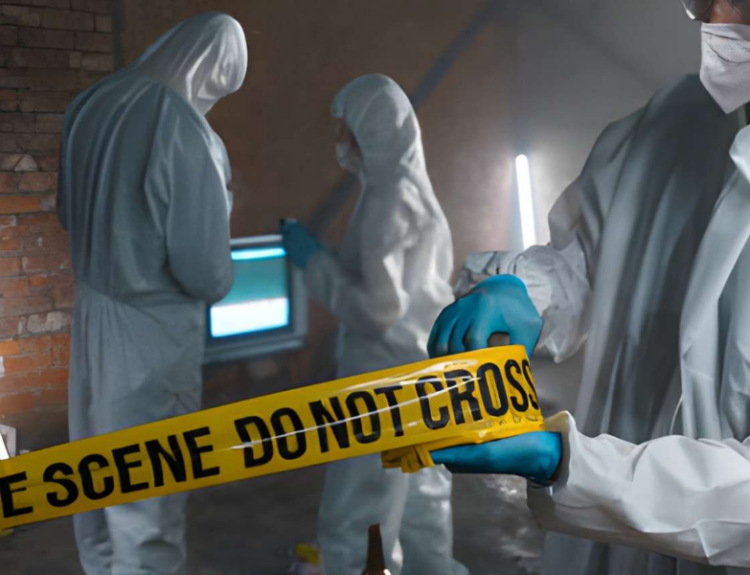Criminologists are professionals who help create laws and policies that prevent crime. However, they are also the experts called to a crime scene or to investigate perpetrators. They also rehabilitate criminals and analyze the impact of crime on society. So, how do you go about becoming one? What’s the career path like? What will you be expected to do? Let’s find out.
Key Takeaways
- Criminologists don’t just sit in an office and examine theories. They study crime trends, work with police and other law enforcement, and work to set policies to keep people safe in communities.
- An education is a beginning, typically with a bachelor’s degree in criminology, psychology, or criminal justice, and then pursuing higher degrees such as a master’s or PhD.
- Practical experience is also essential. Interns, entry-level positions, and certifications all assist you in gaining the applied skills criminology professionals require.
- The career paths are quite varied. You could be a crime analyst, forensic psychologist, policy advisor, or even be employed by the FBI.
- The process does take years, usually six to ten of schooling and experience before you transition into senior-level criminology roles.
- The best news is the employment outlook is good. Criminologists average around $74K per year, with associated jobs experiencing steady increases.
What is the Role of a Criminologist?
The role of a criminologist is to understand crime and criminal behavior. Those who pursue criminologist careers focus on understanding the causes of crime. They do it by analyzing social, biological, and psychological causes that lead to deviant behavior in humans.
Criminologist jobs usually involve:
- Researching crime patterns;
- Developing criminal profiles;
- Collaborating with law enforcement;
- And enhancing crime-prevention strategies.
They also analyze the impact of crime on society and develop tactics that help law enforcement agencies avert crimes. This allows them to reduce criminal activity while improving the justice system. Besides, they explore common criminal behaviors to identify and apprehend suspects. ‘Criminologists aren’t just theorists,’ emphasizes Dr. Joelle Lee-Silcox, Head of Strategic Insights and Planning at The Arise Group. She further explains, ‘we’re problem-solvers who translate research into real-world action. Whether we’re advising policymakers or evaluating rehabilitation programs, our work shapes safer communities.’
How to Become a Criminologist?
You need a formal education to go after the best criminology jobs. You’ll have to earn a criminology degree in various disciplines. You can go for either criminology or criminal justice but the degree must be:
- Criminal Justice
- Criminology
- Psychology
- Sociology
There are specializations for various criminology degrees, such as:
| Criminology Degree | Specialization |
| Bachelor’s in Criminology |
|
| Master’s in Criminology |
|
| Ph.D. in Criminology |
|
Besides the formal criminologist degree requirements, you also need to develop critical skills, such as analytical, research, and communication skills. Lastly, you’ll have to seek positions in law enforcement or relative areas to build experience.
Dr. Lee-Silcox suggests that aspiring criminologists should consider education as a kick start for their practical career instead of a finish line. ‘A degree gives you theory, but field exposure gives you perspective’, she highlights. ‘Internships, volunteering, and policy projects can help you understand social systems that influence criminal behavior’, Lee adds while emphasizing on the significance of combining practical experience with theoretical education.
Skills Every Criminologist Needs
While education and real-world exposure can lead you towards a promising career in criminology, it is critical that you build some skillsets as well. In her interview, Dr. Lee-Silcox highlighted data interpretation, analytical thinking and empathy as the most significant skills for a criminology professional. ‘Criminology is both art and science,’ she says. ‘You must be able to analyze statistics and behavioral patterns while also understanding the human stories behind them.’
Let’s take a look at some of the important skills every criminologist must develop and practice:
- Analytical Reasoning: to be able to analyze and interpret research findings, patterns and data effectively.
- Communication Skills: to have the capability for presenting any research findings or observations in front of policymakers and law enforcement professionals.
- Ethical Judgement: to be able to handle critical yet sensitive information effectively.
- Problem-Solving and Policy Design: to know how to translate important insights into actionable strategies.
‘The best criminologists are those who can balance critical thinking with compassion. Crime doesn’t happen in isolation, it reflects society, and that requires sensitivity,’ adds Dr. Lee-Silcox.
What is the Criminologist’s Career Objectives and Progression?
The career of a criminologist isn’t just about investigating crimes or singling out perpetrators. While it does make a significant part of it, a criminologist’s career path also includes understanding the causes, consequences, and societal response to crime.
Now, the career progression and objectives shift and move as you go along. Here’s what you need to know about either:
| Career Objectives | Career Progression |
| Understand the causes and consequences of crime. | Start with academic qualifications in criminology or related fields. |
| Inform public policy through research. | Entry-level roles in research, law enforcement, or social services |
| Improve crime prevention strategies. | Advancement to positions such as policy advisors, educators, or senior researchers |
| Advocate for effective rehabilitation methods | – |
As mentioned before, you start with the academic qualification. A bachelor’s/master’s degree will set you on the path, but your own quantitative skills will elevate your career. You’ll start with entry-level criminology jobs but move/make your way up.
Here’s a look at entry-level criminology jobs against senior-level jobs:
| Senior Criminology Jobs | Entry-Level Jobs |
| Policy Advisor | Police Officer |
| Crime Analyst | Correctional Officer |
| Forensic Psychologist | Crime Scene Investigator |
| Research Director | Community Development Worker |
It’s primarily considered a reward-based career, so the better you do, the higher the chances of promotion and career advancement will be. Dr. Lee-Silcox strongly emphasizes on the fact that professional growth in criminology is nonlinear, throughout her interview. ‘Some move into policy, others into academia or data science,’ she says. ‘What matters is your curiosity, it’s what keeps you evolving with the field.’
How Long Does it Take to Become a Criminologist?
To become a criminologist, it typically takes 6 to 10 years, depending on education, experience, and career aspirations. The criminologist career path begins with formal education, i.e., a bachelor’s or master’s degree. A bachelor’s degree in criminology with a master’s degree. Besides, any specialization or certificate might take extra time.
Below is a step-by-step progression, highlighting key milestones in the journey. ‘It’s a long rewarding path,’ mentions Dr. Lee-Silcox. ‘Each phase – from undergraduate studies to advanced research – teaches you how to question assumptions and think systematically about justice.’
- Complete High School (Foundation Stage) – 4 Years
The pathway to becoming a criminologist starts with a high school education. While studying in school try to focus on subjects like psychology, sociology, and legal studies. Also, participate in extracurricular activities related to law, debate, or social sciences. Make sure to maintain a CGPA of 3.0 or higher to get admission in a reputed college.
- Earn a Bachelor’s Degree in Criminology or Related Field – 3 to 4 Years
Now, the professional career begins during the college years. After high school, find admission to a bachelor of criminology, psychology, sociology, or criminal justice degree program. Start now by doing some research on top criminal justice colleges in your state. The program helps you to gain foundational knowledge in criminal behavior, legal systems, and crime analysis.
One example would be a BS in Criminology with Homeland Security and Justice Concentration at George Mason University.
- Apply for Internships
After a bachelor’s degree, try to complete internships with law enforcement agencies, legal offices, or research institutions. This will help you gain some practical experience in the field. You can work in entry-level roles such as research assistant, crime analyst, or legal assistant or join government agencies, private security firms, or academic research teams.
- Obtain a Master’s Degree in Criminology or a Specialized Field – 2 Years
To advance further in the career, you will need a master’s degree in criminology in a specialized field. This will deepen your knowledge of criminological theories, criminal profiling, and research methods. Specialize in areas like forensic psychology, criminal justice policy, or crime prevention.
- Advance in the Field with More Experience – 2 to 5 Years
After getting a master’s degree, you can start working in mid-level roles such as policy analyst, senior crime investigator, or forensic specialist. Also, get certifications or attend specialized training programs.
- Pursue a PhD – 3 to 5 Years
A PhD or Doctorate is recommended for those interested in academic, research, or high-level consultancy roles. After getting a doctorate they can conduct original research in criminology, criminal behavior, or law enforcement strategies. They can also teach at universities or contribute to policymaking and criminal justice reform.
So, how long does each phase take? Here’s an outlook in brief:
| Career/Education Level | Time Taken |
| Bachelor’s Degree | 3 to 4 years |
| Master’s Degree | 1 to 2 years |
| Entry-Level Positions | 0 to 2 years |
| Specialized Training/Certifications | 6 months to 2 years |
| Mid-Level Positions | 2 to 5 years |
| Senior-Level Positions | 5 to 10+ years |
How to Become a Criminologist for the FBI?
There’s a specific process to become a criminologist in the FBI. The Federal Bureau of Investigation calls it the “Special Agent Selection System“ (SASS), which includes physical tests as well as background examinations.
The process of getting into and becoming FBI agents is highly competitive, according to American Public University, and applying for the job can be challenging. FBI employees must adhere to strict standards, particularly when it comes to protecting the national security of the country.
Candidates vying FBI employment must meet all the basic requirements, such as:
- Status as a United States citizen
- Having a minimum age of 23 to 36 years
- Be a graduate of an accredited college or university with a bachelor’s degree
- Experience working full-time for at least two years
- Successful completion of a physical fitness test (PFT) and submission of medical documentation as proof of physical fitness
- Non-conviction of a felony
- Paying your financial obligations on time (child support, taxes, and student loans)
- Having a valid driver’s license
- Registration with the Selective Service (only for males)
The application process for an FBI special agent position consists of four steps:
- Filling out an application
- Participating in the Special Agent Selection System (SASS), a multi-phase process
- Receiving an offer of a conditional appointment
- Successful completion of the Basic Field Training Course (BFTC)
Special agents must also undergo a thorough background investigation to be granted a Sensitive Compartmented Information (SCI) clearance.
This is, of course, aside from the academic qualifications and on-field accolades. So, the five key things you need to do to become one include:
- Get a criminology or criminal justice degree from a reputable/accredited university.
- Pursue experience by working in a relevant field, ideally in law enforcement or criminal investigation.
- Apply to the SASS program and pass the examinations.
- Complete the introductory field training course provided by the FBI.
- Keep on learning and taking part in training/certificates provided by the Federal Bureau.
Besides, also find criminology government jobs to earn relevant experience, as the FBI prefers it over private law enforcement experience. Dr. Lee-Silcox highlights, ‘Federal criminology roles like those within the FBI demand not only intellectual rigor but emotional resilience. The work can be intense, but it’s deeply meaningful.’
Best Criminology Jobs, Opportunities, and Salaries
According to the Bureau of Labor Statistics (BLS), the average criminologist’s salary is around $74,000 per year in the United States. There are exceptions, of course, but these jobs usually fall more towards detective police work. So, the job titles look like:
- Criminologist
- Criminal Investigator
- Probation or Parole Officer
- Forensic Science Technician
- Crime Analyst
- Correctional Officer
- Victim Advocate
- Forensic Psychologist
- Cybercrime Investigator
- Police Detective
What do the job outlook/growth and salaries look like for these jobs? It’s important to remember that some of these job titles are just experience variants of the same job. For instance, criminal investigators and police detectives fall under the same category.
Nevertheless, their job responsibilities slightly differ, but their job outlook and salaries are almost the same. Here’s an outlook on job growth and wages for criminology jobs:
| Job Title | Median Annual Salary | Job Outlook |
| Criminal Investigators and Detectives | $95,000 | 5% growth |
| Forensic Science Technicians | $64,000 | 14% growth |
| Probation Officers and Correctional Treatment Specialists | $54,000 | 3% growth |
| Police and Detectives | $74,00 | 4% growth |
All in all, remember that criminology jobs’ salary depends on experience and the particular field.
Conclusion
Criminology is generally considered a growing industry, considering the increasing population and subsequent crime rates. Therefore, law enforcement agencies across the United States (and around the world) require more professionals for crime prevention, investigation, and general police work.
Thus, pursuing this career is a lucrative choice. There are also varying degree options and career paths, which provide students with lots of possibilities. Therefore, if you’re one of them, we suggest thoroughly analyzing this field of work and finding a degree that suits your interests.
‘Criminology isn’t about chasing criminals – it’s about understanding society. If you stay curious, compassionate, and evidence-driven, you’ll always find purpose in this field.’ Concludes Dr. Lee-Silcox.
Reviewed by Criminology Expert Dr. Joelle Lee-Silcox

Dr. Joelle Lee-Silcox is a pracademic who blends scholarly rigor with law enforcement experience to transform data into community-focused public safety strategies. As Head of Strategic Insights & Planning at The ARISE Group, she guides data-driven initiatives that bolster efficiency, transparency, and trust. In her role as a Senior Implementation Strategist for the Center for Policing Equity, she partners with agencies to align policy and practice, facilitating analysis, community engagement, and procedural-justice reforms that strengthen accountability. As the former Chief of Staff at the Miami Police Department, she led strategic planning and special projects units, driving major policy overhauls, grants totaling several million dollars, and programs that contributed to reductions in homicides and property crimes. With a Ph.D. in International Crime & Justice, she teaches at Florida International University and remains committed to strengthening police-community partnerships and advancing the policing profession through the ethical use of data.








